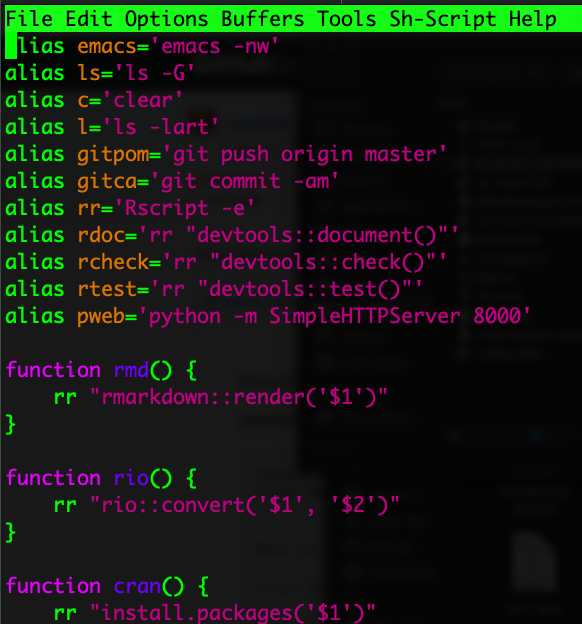chainsawriot
Home | About | ArchiveWeek 3: Shell aliasing for R programmers

I use RStudio very rarely. I think the major reason for me to stick with emacs is that I can have a relatively consistent working environment, being it on a desktop or on a server, for the development of all languages (R, Ruby, Python, C++, …). This stickiness to emacs makes me a weirdo sometimes because the new generation R programmers are using RStudio exclusively. When I need to give a demo for example, I need to decide whether to use emacs/ESS or RStudio. Having said that, RStudio is an impressive working environment. The reason for me not to use it, as I said, has nothing to do with its features or ‘weaknesses’.
One impressive feature of RStudio is its close integration with R packages. For example, it has a really nice interface to devtools so that one can click a button to run devtools::document().
I can actually implement similar features with elisp so that I can use them in emacs/ESS. 1 But my way of R development is quite weird. I like to have an interactive R session and an UNIX shell running side-by-side. I usually switching between the R session and the shell to work with different things.
Because of this way of working, I have customized my shell such that it can help me with my R development. For example, there are many R functions we run them for the side-effect. devtools::document() is a great example. For these R operations, they are ideal to be converted into aliases.
As a background, there are actually two ways 2 to execute R commands from shell.
R -e "mean(c(1, 2, 3, 4))"
Rscript -e "mean(c(1, 2, 3, 4))"
You may test the different between the two, but you can quickly find out Rscript is the preferred way.
In my shell, I created an alias to Rscript -e and put it in my .zshrc. So that I can save some typing.
alias rr="Rscript -e"
In my .zshrc, I have the following aliases to launch devtools operations.
alias rdoc='rr "devtools::document()"'
alias rcheck='rr "devtools::check()"'
alias rtest='rr "devtools::test()"'
alias rpkg='rr -e 'devtoos::test(); devtools::document(); devtools::install()'
It is also possible to write functions to parameterize R-related operations. For example, rendering an RMarkdown document or installing an R package from CRAN.
function rmd() {
rr "rmarkdown::render('$1')"
}
function cran() {
rr "install.packages('$1')"
}
These shell functions can be launched with
rmd my_rmd_file.rmd
cran rio
Another example is a shell function to convert data file
function rio() {
rr "rio::convert('$1', '$2')"
}
And launch with
rio mydata.csv mydata.xlsx
Shell customization is addictive and fun. Although this video is about Ruby, many principles also apply to R.
3 down, 49 to go.